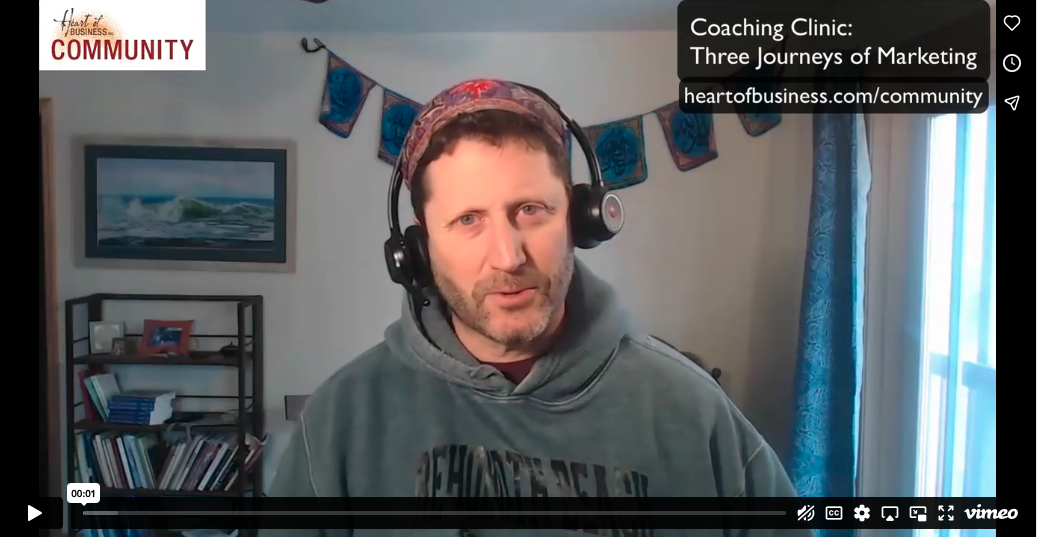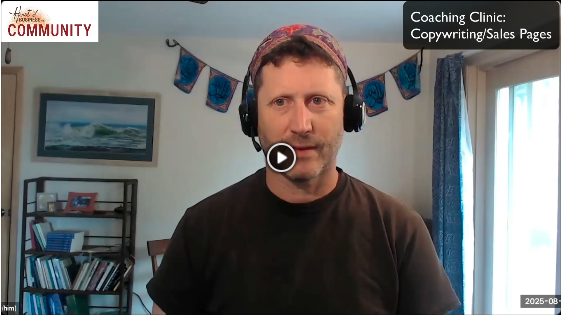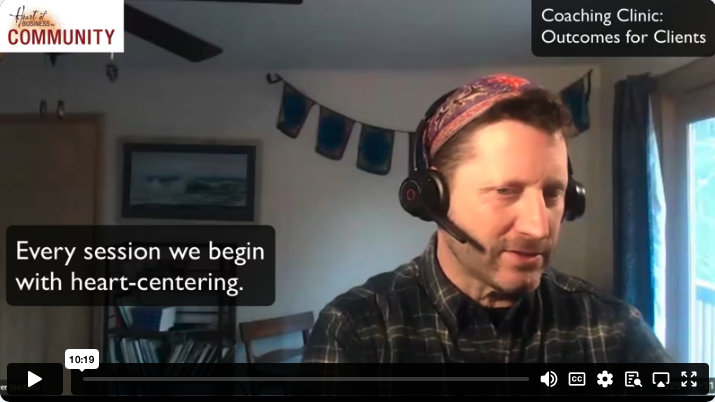A while ago I wrote an article, Avoiding the Horror of the Sliding Scale, in which I took a very strong stand against sliding scales because of the burden they put on your readers. Really.
Many people who put a sliding scale into place do it because they are uncomfortable with money and pricing. In these cases, the sliding scale is not a favor to the clients, it’s offloading the struggle with money onto the client, leaving them with the uncomfortable task of deciding how much to pay you, and worried about whether they’ll get it “right” or not.
 I was all happy and content about it, until I met my brother-of-the-heart in marketing, Tad Hargrave, who is the first person I’ve ever met who really took on the whole “pay what you can” topic and worked it through to such an amazing extent. I still believe my stance carries a lot of truth, and yet Tad knows how to make it not true, and to successfully use the Pay What You Can strategy for your heart and your business.
I was all happy and content about it, until I met my brother-of-the-heart in marketing, Tad Hargrave, who is the first person I’ve ever met who really took on the whole “pay what you can” topic and worked it through to such an amazing extent. I still believe my stance carries a lot of truth, and yet Tad knows how to make it not true, and to successfully use the Pay What You Can strategy for your heart and your business.
And why do I call him my “brother-of-the-heart in marketing”? Because he is. I felt a kinship with him when we spoke, and a real alignment with what he’s doing. We’re talking about co-teaching a workshop in Portland next year.
Let me just quote from his own bio:
Now 34, Tad is one of North America’s younger (and more unusual) marketing consultants.
Anti-capitalist anarchism + decolonization work + marketing nerd + liberal amounts of charm + a history of street magic seems to = Tad Hargrave.
For the past decade, he’s been working to bridge the worlds of business and activism and explore the questions of ‘how do we take down a system that is rotten to the core – but still pay our rent while we do it? How do we build our communities while also building our communities and movements for positive change? How do we make a living without falling into traps of spiritual materialism, greed and consumerism?’
To that end – he’s slowly working on a book called “The Pay What You Want Economy” – exploring how various businesses around the world – from magazines, to bands like Radiohead, to restaurants to street magicians have made their living entirely off of donations.
Yup, There’s an Interview
It’s true, I realized once he told me about Pay What You Can, I wanted to hear about it. It’s fascinating. There’s so much more to it than just telling clients, “Hey, pay what you feel like.” If you do it like that, it will fail, and it will push people away, like I was talking about up at the top.
If your heart is yearning to open up the whole pricing issue, then you’re going to want to listen to Tad. It’s an hour-long interview. You need to listen to the whole thing, especially the last two parts.
You see, when I interviewed him we were both sick (you get to hear us coughing and hacking a bit on the recording- but not too bad), and near the end I said something that reminded him of a few really important details.
So, without further ado, here’s the interview:
Part One 8.5 MB, 18:29
[audio:http://heartofbusiness.com/Audio/tad-pay-what-you-can-1.mp3]
Tad Hargrave Interview, Pay What You Can, Part 1
Part Two 7.5 MB 16:24
[audio:http://heartofbusiness.com/Audio/tad-pay-what-you-can-2.mp3]
Tad Hargrave Interview, Pay What You Can, Part 2
Part Three 5 MB 10:55
[audio:http://heartofbusiness.com/Audio/tad-pay-what-you-can-3.mp3]
Tad Hargrave Interview, Pay What You Can, Part 3
Part Four 3.5 MB 7:40
[audio:http://heartofbusiness.com/Audio/tad-pay-what-you-can-4.mp3]
Tad Hargrave Interview, Pay What You Can, Part 4
I’m Guessing Now You Want More of Tad
So here he is:
His website: Radical Business. Sign up for his newsletter. Yes, do.
His three day workshops, using on Pay What You Can pricing:
Radical Business Intensive
A Facebook group he started, The Pay What You Can Economy
So, What’d Ya Think?
Interested in taking on his Pay What You Can approach? Thoughts? Insights?







7 Responses
Hey Mark,
This is a model that we’ve been using at Watershed Community Wellness. In particular, Brandt Stickley uses what he calls the “Gift Economy” model to run his shifts at the clinic. http://www.charityfocus.org/blog/view.php?id=2097
I still have my reservations about it, but am totally on board with the basic concept. Where this interview really lit up for me for me is when it became clear that Tad doesn’t do it for all of his income. I appreciated that he noticed that it’s easier to do this for parts of your business that won’t add a bunch of extra work for you.
It seems eminiently reasonable to me to do it for particular facets of my business – for instance, classes and workshops (Qigong, seasonal health, etc) as opposed to my actual acupuncture and Chinese herbal sessions.
I think if you, as the person offering, have another source of income and aren’t relying on the income from the “Gift Economy” or “Pay What You Can” stream, your gift can be much cleaner and maybe it doesn’t create the same energetic stress on the relationship. It truly is simply a gift. This feels very different than the normal sliding scale situation.
On the other hand, if you really need a certain amount but are simply afraid to ask for it, there will be that weirdness.
Just my thoughts…
Eric
http://watershedcommunitywellness.com
.-= Eric Grey´s last blog ..Stripped to the bone =-.
A sliding scale doesn’t bother me, but I want to create the scale. If someone doesn’t want to pay my speaking fee I’m willing to negotiate, but I won’t do it for a few bucks. If they can only afford $100, I would have to pass. That’s the beauty of the sliding scale, I can always say no.
Yes, it’s hard to say no, but that’s on me, not them.
Great Interview!
.-= Karl Staib – Work Happy Now´s last blog ..Reader Dilemma
Hi Mark,
I love the idea of the sliding scale.
Especially because I’m dealing with health and it is hardly fair that health only be for the wealthy.
Which would mean that the product will probably be more popular with the poorer people.
I wonder if it works for those starting out rather than those with a market already (Radiohead and so forth). Or for those where a standard price isn’t established (eg. info products).
Looking forward to the MP3’s and checking out Tad’s website.
.-= Evan´s last blog ..Vulnerability and Safety =-.
@Eric- Yes, I loved that he was direct about that.
@Karl- Absolutely- taken responsibility for your sliding scale is what it’s all about- as long as you aren’t off loading your money issues onto someone else. And then you can say no- yah!
Although what Tad is talking about is different- because in the situations he describes, he won’t ever say no, even if someone doesn’t pay anything. But, it’s different than the situation you’re describing.
@Evan- Definitely I hope you did listen to the interview- because he’s not really talking about “sliding scale.” It’s something else entirely.
I love this interview. I learned a great deal – and i heard your beautiful voice for the first time!
Im commenting to add the model my yoga teacher uses. She’s quite comfortable financially and opted to offer the proceeds of every class to a family in our community. She uses an honor system and sliding scale, asking $5-$20 per class. We can attend class w/o paying, marking it on the attendance sheet and paying when we can.
This keeps me from missing classes when money is tight and makes me want to contribute more. Because it feels like that… like a contribution.
Usually, I pay $5 a class and then, once in a while, I just throw $50 or $100 into the basket (when I have it). I do this because it feels right to me.
Thank you, Amy, for your kind words. Isn’t he amazing? There’s a part of me that could just fold Heart of Business and feel relaxed, knowing that he’s one of the people doing this work in the world.
That’s a beautiful story about your yoga teacher. Of course, it requires her to already be comfortable, and it’s still a beautiful relationship to have.
Tad a capitalist? He hates business. He has expressed the position that Western Society is destroy the world and should be destroyed.